Recently there’s been a bit of a buzz about antihistamines as a treatment of IBS. Let’s find out why!
Histamine is a small protein, a biogenic amine that the body makes and uses in many processes. It influences acid secretion in the stomach, it takes part in allergic reactions and in controlling body temperature (to name a few). It is a highly necessary substance, not a toxin, though like anything else, in high amounts it can cause toxicity. There are cases of difficult histamine poisoning from eating certain fish very high in histamine.
That said, most of the histamine in the body is made by the body, and only about 5% comes from food. Our gut microbes can also make histamine. Inside the intestines, there is an enzyme called diamine oxidase (DAO) that breaks down histamine and prevents negative effects from arising when eating foods high in histamine.

An increase in histamine causes a wide array of symptoms, ranging from IBS-like symptoms of constipation, diarrhea, and nausea, to headaches, hives, flushing, heart palpitations, nasal congestion etc.
The more common causes of increased histamine include foods high in histamine, problems in the DAO enzyme, and increased production by gut microbes. Mast cells (part of the immune system) store histamine and are the main producers of histamine in the gut, and they can also be stimulated to release too much histamine, for example due to stress, infection, or eating certain foods. Alcohol can block DAO, and certain drugs, like antibiotics and NSAIDs, can do the same.
Some studies have found that people with IBS have higher levels of histamine (and in some cases mast cells) compared to people who don’t have IBS, so should histamine be something to consider for IBS? Perhaps avoiding histamine-rich foods, or taking DAO supplements, or antihistamines.

This is a good question.
If you are someone, who is already avoiding a lot of foods, and perhaps on a strict low FODMAP diet, adding a low histamine diet on top seems too much. I would really work on expanding your diet in these cases rather than restricting more, as sweeping diet restrictions can lead to malnutrition, decreased quality of life, food fears (which feed gut symptoms) and unwanted changes to the gut microbiota.
But if you’ve clearly noticed that a food or a few foods cause an array of symptoms that sometimes start even within minutes, trialing avoiding this food for a few weeks seems sensible. That said, research is very much lacking on the effectiveness of a low histamine diet, not just in IBS, but even in diagnosed histamine intolerance (btw, histamine tolerance is also a diagnosis of exclusion, without a test that you can just simply take). If you’d like to explore trying a low-histamine diet, I’d recommend working with a dietitian to avoid problems.
What about supporting histamine breakdown with DAO supplements? There are no studies that I could find that look specifically at IBS. Supplements in general are not well controlled (always choose a third party tested product) and may come with side effects, so it’s questionable whether they would be of help.
When it comes to antihistamines, H1 antihistamines could improve abdominal pain, as they block pain sensing receptors in the gut (they don’t reduce histamines). However, there are only two studies on this to date. H2 antihistamines are used widely for heartburn and gastroesophageal reflux as they reduce the acidity of the stomach.
Long story short, histamine may be playing a role in IBS, most likely through mast cell activation. But whether avoiding histamine containing foods, or taking antihistamines are good ideas, the evidence is still highly limited and drawing conclusions is difficult at this time. If you are wondering if histamine could be a problem for you, I’d advise you talk to your doctor.
If you feel like your life is being controlled by your gut problems, it’s time to do something about it. Schedule a free call with me to discuss your situation to see what your best next step toward IBS freedom would be.

Love,
Anna-Kaisa
PS. Have you already downloaded your free guide “5 Easy Ways to Beat the Bloat”?
PPS. I’m hosting a free webinar on March 4th on nutrition and stress to entrepreneurs (though anyone will get great insight into how stress and nutrition affect each other). It’s at 16:00 GMT+2 - to sign up, go here.
Could the answer to IBS lie in the ancient practice of meditation?
IBS is a world-wide problem and the most common gastrointestinal disorder.
For a long time, irritable bowel syndrome has just been thought of as a functional problem: there’s nothing measurably, or visibly wrong with the intestines, so labeling IBS as a functional problem is almost like a shrug from the experts.
Now, IBS has earned a new classification: a disorder of gut-brain interaction. So, instead of IBS being a functional problem, there’s actually something physical that becomes disrupted – it’s just not visible to the naked eye.
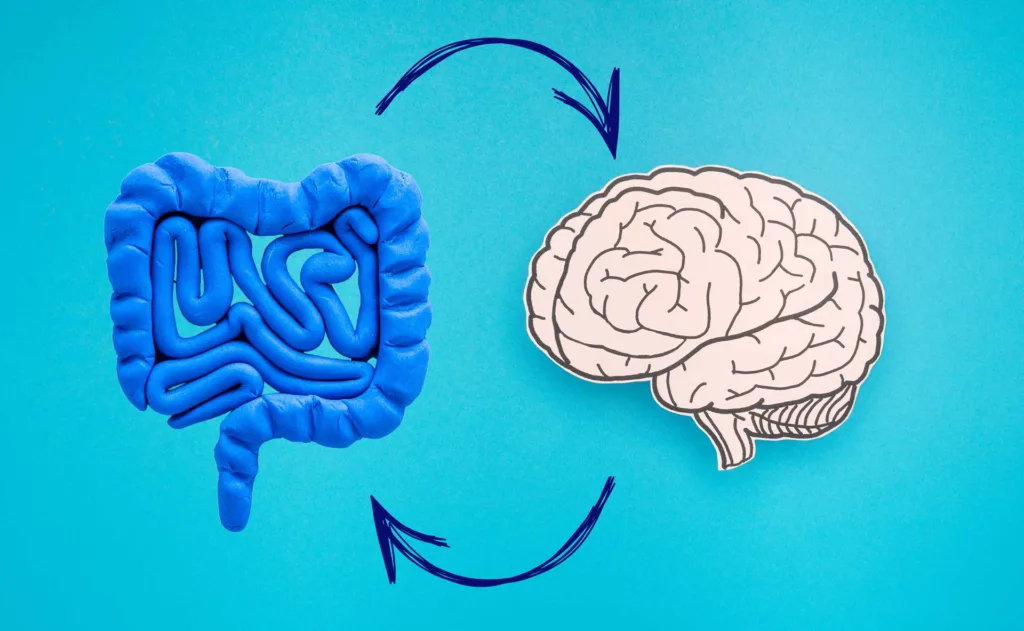
What is gut-brain interaction? It is the two-way communication highway between your brain and your gut. It’s also called “gut-brain axis”. When the connection is disrupted, there are misunderstandings and overreactions that lead to IBS symptoms. You can read more about the gut-brain axis in this blog post.
What disrupts the gut-brain interaction? Many things, but a big culprit looks to be stress (1). Stress causes stress hormones to surge in the body, which turn digestion off. With a lower digestive “fire”, food digests poorly, leading to abdominal pain, diarrhea/constipation and/or bloating.
To make matters worse, the brains of people with IBS are wired in ways that make them more sensitive to stress, triggering a stress response more easily, which causes a difficult situation to turn into gut symptoms more easily as well. (2)
Solution? To mend the gut-brain interaction through stress release practices and mindset shifts.
My favorite method is meditation. It feels like an antidote to pretty much anything, sort of how exercise and good nutrition are.
When it comes to IBS, there are studies linking meditation to improved IBS symptoms, like improved abdominal pain and improved quality of life. (3)

And what I’m really excited about, is meditation’s ability to change the brain to withstand stress better (4). This means that while stress is not going to go away, you cope better with stress, and a stressful situation less easily leads to IBS symptoms. Naturally, these effects come from a long-term practice. But, even a one-time practice of a few minutes of meditation can measurably reduce stress. (5)
Personally, after 15 years of practice, daily meditation has become my secret weapon. Not only do I feel great while meditating (though not always, sometimes my brain is just too restless), I’ve noticed in general feeling calmer, more empathetic, and having a better emotional control than I used to. It feels like my brain gets triggered less easily.
One of the meditation techniques I particularly love is Hong Sau (Sau pronounced “saw”). It’s a technique of attentive focus on the breath. Since the breath is always there, it becomes an excellent object for meditation (no, meditation is not about blanking the mind). A focused mind is a calm mind, and a calm breath leads to a calm mind and vice versa. Or how do you breathe when you are reading a book with deep focus?
I’m teaching the Hong Sau meditation technique live online starting today on Wednesday January 8th 2025. There’s still time to sign up! Even if you miss the first class, you can still participate live in the remaining four. All the sessions will be recorded, so you’ll get the recording of the first session, and they will be made available for purchase as a full course after the live course is finished. Go here for more info. Sign up by emailing me at [email protected]
Questions? You got my email address.
Let’s make the year 2025 the best one yet! Let’s start by taking up meditation, or some other stress release practice, and cultivating the belief that improvement is possible – I really do believe that. Even if you feel like you’ve tried everything, something will help you, if you keep working at it.

Love,
Anna-Kaisa
References
- Cryan JF, O'Riordan KJ, Cowan CSM, Sandhu KV, Bastiaanssen TFS, Boehme M, Codagnone MG, Cussotto S, Fulling C, Golubeva AV, Guzzetta KE, Jaggar M, Long-Smith CM, Lyte JM, Martin JA, Molinero-Perez A, Moloney G, Morelli E, Morillas E, O'Connor R, Cruz-Pereira JS, Peterson VL, Rea K, Ritz NL, Sherwin E, Spichak S, Teichman EM, van de Wouw M, Ventura-Silva AP, Wallace-Fitzsimons SE, Hyland N, Clarke G, Dinan TG. The Microbiota-Gut-Brain Axis. Physiol Rev. 2019 Oct 1;99(4):1877-2013. doi: 10.1152/physrev.00018.2018. PMID: 31460832.
- Mayer EA, Ryu HJ, Bhatt RR. The neurobiology of irritable bowel syndrome. Mol Psychiatry. 2023 Apr;28(4):1451-1465. doi: 10.1038/s41380-023-01972-w. Epub 2023 Feb 2. PMID: 36732586; PMCID: PMC10208985.
- Baboș CI, Leucuța DC, Dumitrașcu DL. Meditation and Irritable Bowel Syndrome, a Systematic Review and Meta-Analysis. J Clin Med. 2022 Nov 2;11(21):6516. doi: 10.3390/jcm11216516. PMID: 36362745; PMCID: PMC9658118.
- Taren AA, Gianaros PJ, Greco CM, Lindsay EK, Fairgrieve A, Brown KW, Rosen RK, Ferris JL, Julson E, Marsland AL, Bursley JK, Ramsburg J, Creswell JD. Mindfulness meditation training alters stress-related amygdala resting state functional connectivity: a randomized controlled trial. Soc Cogn Affect Neurosci. 2015 Dec;10(12):1758-68. doi: 10.1093/scan/nsv066. Epub 2015 Jun 5. PMID: 26048176; PMCID: PMC4666115.
- Mandlik GV, Siopis G, Nguyen B, Ding D, Edwards KM. Effect of a single session of yoga and meditation on stress reactivity: A systematic review. Stress Health. 2024 Jun;40(3):e3324. doi: 10.1002/smi.3324. Epub 2023 Oct 11. PMID: 37822096.
The low FODMAP diet is a relatively well researched diet for IBS. Studies show that the low FODMAP diet can ease symptoms in about 2/3 of cases in varying degrees (1). But that’s just it – this diet is not a true treatment for IBS as it can only manage symptoms and not the cause of IBS. But more on that later.
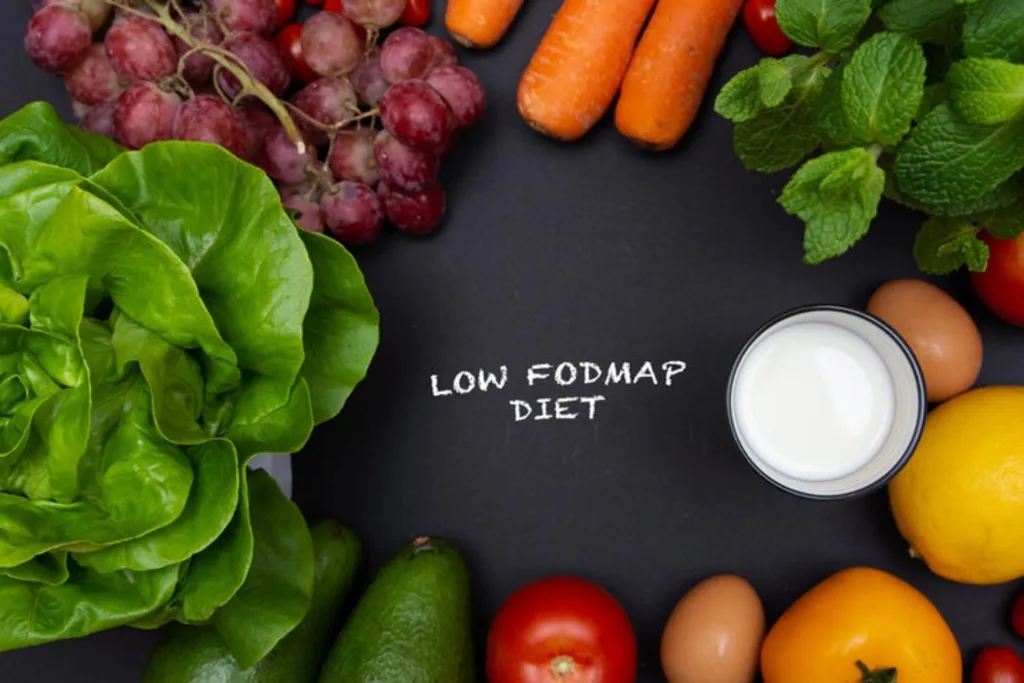
The idea behind the diet is that FODMAPs (fermentable oligosaccharides, disaccharides, monosaccharides and polyols), which are naturally more difficult for the body to digest, are minimized in the diet and then brought back one FODMAP group at a time. This is because you want to only avoid those FODMAP groups that trigger symptoms – it’s not usual that all FODMAP groups are the problem. Because these fibers don’t digest well, they attract water into the intestines and are fermented (digested) by your gut microbes, both of which can cause bloating, discomfort and potentially diarrhea/constipation.
The thing is, this happens to everyone eating FODMAPs, especially in large amounts. The reason why people with IBS so often find these fibers problematic is that they have visceral hypersensitivity - they feel everything going on the intestines more strongly. Even normal things in the gut can cause bloating and pain, when normally you wouldn’t feel anything at all.
It’s important to know that FODMAPs are not bad for you. They feed the healthy gut bacteria in the large intestine, which is actually very good for your health. Avoiding FODMAPs gives the gut bacteria less food to process, which reduces their gas production and in turn gut symptoms. Unfortunately, studies have noticed that some beneficial bacteria species are reduced on the low FODMAP diet probably for this reason.
This is one reason I’m not the biggest fan of the diet. Other reasons are:
- The potential for food fears: there is a risk that you begin labeling high FODMAP foods as bad, which can lead to fear toward these foods. Fear is not helpful for gut function.
- Increased stress: the low FODMAP diet is not the easiest diet to follow. If you want to try the diet, always make sure you understand what you are doing, and even better, get guidance from an expert dietitian. Even then the diet tends to cause stress, and stress causes IBS symptoms, so following the low FODMAP diet can be counterproductive from this standpoint.
- It doesn’t treat the underlying cause: a problem in the gut-brain interaction. Perhaps, if your symptoms improve on the diet and you feel relief and reduced stress from the improvement, this can help mend the disrupted communication between the gut and the brain. But it’s not the diet change that truly did it, it’s the feelings and thoughts that followed that made the difference.
- Nutrient deficiencies: if you only cut foods out and don’t bring the right low FODMAP foods in, there is a risk of not getting enough of all the nutrients you need. Malnutrition is never supportive of gut health.
- Often there are bigger fish to fry than your diet when it comes to IBS management. If your lifestyle is not supporting your gut health, diet changes likely have a very limited impact on your symptoms. If you don’t sleep enough or if you are very stressed out for example, IBS symptoms may not be affected in any way by the low FODMAP diet.
- The low FODMAP diet asks you to avoid healthy foods, like whole grains and certain fruits and vegetables.
- Potential negative effects on your gut microbiome as mentioned above
What you eat is highly important for gut health, of course, but to me, going on the low FODMAP diet is not the best way to go, especially not as the first thing to try. Chances are I’d still recommend some individualized diet changes, but nothing too drastic to avoid the above problems. In addition, focusing on the root cause will be vital to get real IBS symptom improvement.

How do you do that? You need to think about yourself as a whole – everything that is going on in your life and your body is affecting everything else. It’s not just about food.
My best advice? Get in touch with me to see what might be the most important diet and lifestyle changes for you. Book your free session here.
Or, if you prefer to work on your own, I have the perfect self-care program for you: IBSwise. It goes over everything worthy of knowing about IBS, with many tools that you can try right away to ease your symptoms – tools that focus on mending the gut-brain communication to achieve real results. It’s an awesome program and I highly recommend it. The price is going up on 1/1/2025, so get enrolled now!
You can get started on calming the real problem behind IBS by practicing a breathing exercise like box breathing at least once daily. Go to Instagram to my account @ibsandstressdietitian and find there a short instructional video on box breathing pinned at the top of my posts. My clients are benefiting so much from practicing breathing exercises, so this tip is my gift to you.
Wishing you all the best,
Anna-Kaisa

PS. Did you get my free “5 Easy Ways to Beat the Bloat” ebook? If not, go here to get it!
References:
- Manning LP, Yao CK, Biesiekierski JR. Therapy of IBS: Is a Low FODMAP Diet the Answer? Front Psychiatry. 2020 Aug 31;11:865. doi: 10.3389/fpsyt.2020.00865. PMID: 33110411; PMCID: PMC7488954.
I’ve recently noticed a diet that is trending – the carnivore diet – not just among people in general, but also among people with IBS. Being a dietitian makes me very interested in all diets, but I must say this one makes me very curious. From my educational background this diet seems to be completely counterproductive, as it goes against all dietary guidelines out there. So why is it becoming a thing anyway?
It's because some people who follow the carnivore diet report feeling much better after switching. They feel more energetic and lighter than before. They report that their IBS symptoms get better, even disappear in some cases. As a registered dietitian I must admit I am sceptical, so let’s dig in and see what is going on here.
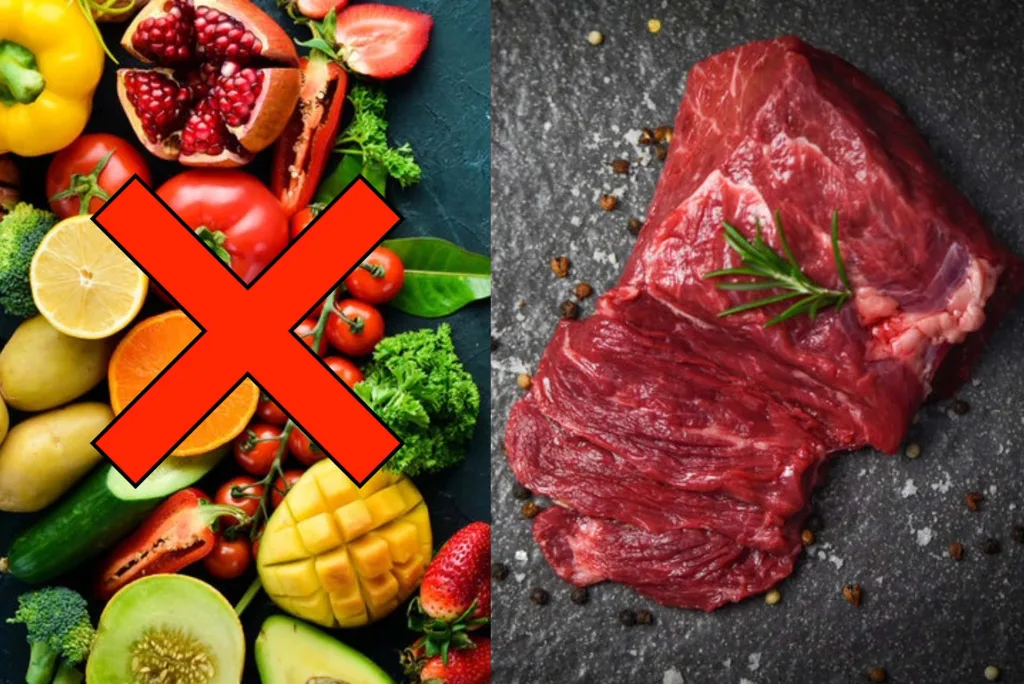
The Carnivore Diet: A Closer Look
Let’s first find out what this diet is. This diet is almost exactly as it sounds: it is all meat, fish and chicken. You are also allowed a little bit of cheese, heavy cream and eggs. Fat sources are lard and tallow, although some allow plant oils in the diet also. You can drink unsweetened coffee and tea and add spices that contain no carbs.
Basically, this diet is an extremely low carbohydrate diet, very high in protein, and high in fat. It is not possible to get all the nutrients your body needs from this diet, especially vitamin C, B vitamins, vitamin K and calcium, unless you include a variety of organ meats in your diet every day, like liver, kidney, and brain. For omega-3 fatty acids, it’s important to eat fatty fish, like salmon. Unless you drink coffee or tea, this diet contains hardly any antioxidants - these are highly beneficial for your health as they fight free radicals that damage your tissues. Animal foods contain no fiber that are needed to support the health of the gut microbiota.
To sum up, the carnivore diet is a highly restrictive eating plan that consists of 99% animal-based foods and carries with it a high risk of malnutrition. How is it possible then, to feel better with this diet?
Why you might feel better on the carnivore diet
There are no objective studies done, so I can’t say anything for sure, but I have a few theories why someone might feel better.
- You eat hardly any processed food and no sugar. Processed food is a big problem in today’s world. These foods usually contain additives, sugar, and hardly any vital nutrients, and so they are harmful to health. People who follow the carnivore diet are likely to eat a lot less processed food, perhaps even none, unless they choose deli meats and sausages etc. on their plate.
- Ketosis. The carnivore diet contains close to 0 grams of carbohydrate, which means the body must go into ketosis to survive. People on a ketogenic diet report feeling more alert (though not always!). Ketogenic diets also increase fat loss in the body, which helps lose weight and may help make you feel better (at least in the short term).
- Placebo effect. It is a big dietary change, and if you are expecting to feel better, the placebo effect can help you achieve this. At least for a while. Placebo effect tends to lose power long term.
- No carb fermentation. Gut symptoms may improve as there is no fiber for the gut microbes to process and make gas from – bloating and flatulence improve. However, a diet with no fiber, and without green/herbal tea no polyphenols either, cause negative changes to the composition of the gut microbiota (=dysbiosis). The lack of fiber tends to lead to constipation, and some people might even experience diarrhea caused by the dysbiosis.
It’s important to note, however, that there is no guarantee that you will continue feeling better in the long term. I’m almost certain the feeling will go away quickly, as the gut microbiota changes will affect your health negatively. Scientists can’t even study this diet properly, as it is unethical to conduct a study on a diet that is known to be risky. Here are some reasons why it is highly risky to follow the carnivore diet, especially for longer than a few days.

The risks involved with the carnivore diet
- Who knows what this does in the long term! There are no studies, and objective studies are not possible because of ethical reasons as mentioned above. Researchers would have to rely on a small group of volunteers, and so there would be many biases that come from a non-random study groups making results untrustworthy.
- In the long term, you will very likely get nutrition deficiencies without supplementation. Nutrition deficiencies lead to malnutrition and poor health. You become fatigued and low in energy.
- No fiber in the diet leads to gut microbiota dysbiosis, which leads to health problems
- Gut microbes will need to process proteins and amino acids instead, leading to production of potentially harmful compounds.
- High meat consumption is linked to a host of health problems, like gout, osteoporosis, and kidney stones, and even colon cancer, whereas plant rich diets are linked to longevity and lower risk of chronic illnesses.
- No antioxidants at all, unless tea/coffee is added to the diet (which is cheating the diet). Antioxidants fight free radicals and tissue damage.
- Humans are not actually carnivores, we are omnivores. Just compare the digestive systems of a wolf and a human. It’s not built to process only animal protein.
- Very high protein content. Excess protein will be turned into carbs and other molecules, and getting rid of protein waste products is very tough on the body and stressful for the kidneys.
- The diet is not sustainable, you’ll get cravings eventually and it will be hard to maintain the diet. Resuming to your normal diet after being on a carnivore diet can cause you to regain all the weight you had lost, and sometimes gain even more.
- Following the diet increases the risk of disordered eating for people prone to them.
- Constipation from no fiber / diarrhea from changed microbiota.
Who should not try this diet

I wouldn’t recommend anyone following the carnivore diet, but people who are pregnant, lactating, have heart disease, kidney disease and potentially diabetes should not try this diet. Some experts also include people with IBS in this group, as the digestive system needs fiber to function normally.
But what about the Inuit?
The carnivore diet (or any meat-heavy diet for that matter) is against the dietary recommendations of any given country in the world. But then we have Inuits who mostly eat fish and meat. They seem to do well on this diet. So why shouldn’t others do the same?
This is an excellent question! Here’s what I found.
The reason for why the Inuit have been thriving on a diet that is high in animal protein is a result of thousands of years of genetic adaptation. These genes help the Inuit utilize high-fat diets well, and these genes are not commonly found in Europeans for example.

However, it’s important to note that the traditional Inuit diet is not a carnivore diet, it also includes local plant foods, studies are estimating their diet is 8-50% carbohydrate. Also, the Inuit eat lots of marine mammals and fish, including their internal organs, which helps provide more of the nutrients the body needs.
It has been thought that heart disease doesn’t exist among the Inuit population, but this might not be the case. Another problem with this diet is also that it doesn’t promote bone health - the Inuit have been found to have very poor bone health and early onset osteoporosis.
What to do instead
If you have IBS, and are seeking a diet that minimizes symptoms, it shouldn't be the carnivore diet. It might not be the low FODMAP diet either. What you need is a balanced, highly individualized diet that takes into account much more than just your gut symptoms, such as your age, gender, background history, habits, skills and so on. This is what dietitians do – they look at your diet from all angles and recommend changes to support your gut health, your overall health and your wellbeing.
If you are considering trying out an extreme diet like the carnivore diet, it is a sign to talk to an IBS dietitian and get real solutions that bring you real results, without risking your long term health. Book a free gut health review with me to kickstart your journey to finding your very own, best possible IBS diet.
With love,
Anna-Kaisa

PS. If you haven’t yet, download my free “5 Easy Ways to Beat the Bloat” guide packed with actionable tips that you can start applying in your day to day life right away.
PPS. Let’s chat! There is a right IBS diet for you out there. Book your free gut health review now!
References:
- LeWine, H. E., What is the carnivore diet? Harvard Health Publishing. 2024. Accessed 11/20/2024
- Eagle, R, medically reviewed by Seitz, A. Carnivore diet: What it is and how to do it. 2020. https://www.medicalnewstoday.com/articles/carnivore-diet accessed 11/20/2024
- Campbell, T. Masai and Inuit High-Protein Diets: A Closer Look. NutritionStudies.org. Accessed 11/20/2024
- Fumagalli M, Moltke I, Grarup N, Racimo F, Bjerregaard P, Jørgensen ME, Korneliussen TS, Gerbault P, Skotte L, Linneberg A, Christensen C, Brandslund I, Jørgensen T, Huerta-Sánchez E, Schmidt EB, Pedersen O, Hansen T, Albrechtsen A, Nielsen R. Greenlandic Inuit show genetic signatures of diet and climate adaptation. Science. 2015 Sep 18;349(6254):1343-7. doi: 10.1126/science.aab2319. PMID: 26383953.
- Oliphant K, Allen-Vercoe E. Macronutrient metabolism by the human gut microbiome: major fermentation by-products and their impact on host health. Microbiome. 2019 Jun 13;7(1):91. doi: 10.1186/s40168-019-0704-8. PMID: 31196177; PMCID: PMC6567490.
To truly manage IBS, you need to fix the way your brain and your gut talk to each other.
When talking about irritable bowel syndrome and IBS symptoms (abdominal pain, bloating, diarrhea, constipation), the discussion is not complete without considering the gut-brain axis. Especially since IBS experts are now calling the syndrome a disorder of gut-brain interaction. It’s a fascinating subject that reminds you how everything in the body affects everything - in good and in bad. This applies also to managing IBS symptoms: it’s not enough to focus on one aspect of gut health, like your diet, but also sleep, circadian rhythms, exercise, stress, and even thoughts have to be assessed as all of these affect the gut-brain axis.

What is the gut-brain axis
Often called the gut-brain-microbiota axis, the gut-brain axis is the communication channel between the gut and the brain, the two-directional phone line between the two.
Your gut and your brain are talking to each other all the time! The main office (the brain) wants to know what the branch office is doing (the gut) and give orders if need be. They relay information back and forth about gut processes, hunger, satiety, stress, and feelings, just to name a few.
Problems in this information exchange are linked to irritable bowel syndrome and other “functional” gut problems, immune function, sleep problems, mood disorders, neurodegenerative diseases, and even obesity.
How are your gut and your brain connected?
It’s not simple. Many processes are involved:
- Central nervous system (brain and spinal cord): both the sympathetic (stress response) and the parasympathetic (rest response) branches of the autonomic nervous system are involved, especially the vagus nerve
- Enteric nervous system (gut’s own nervous system)
- Endocrine pathways (hormones): such as HPA-axis with cortisol (stress hormone), gut hormones like ghrelin (hunger hormone) and leptin (regulates appetite)
- Immune system of the gut: cytokines (inflammation controlling molecules)
- Microbiota (gut microbes) and the molecules they produce, like short chain fatty acids and neurotransmitters

To simplify, what you need to know is that
- The enteric nervous system takes care of digestion, but the brain can override its functioning in stressful situations.
- The vagus nerve is the main information pathway between the brain and the gut, and there is evidence to show that it’s not working well in people with IBS.
- Gut microbes are highly important, and how you take care of them makes an impact on the gut-brain axis level also.
What disrupts the gut-brain axis
It’s not completely clear how this happens, but it seems stress plays a big role, as does the health of the gut microbiota. Your gut microbes are affected by your lifestyle and your diet, both in helpful and harmful ways. It is thought that dysbiosis of the gut microbiota (negative changes in your gut microbes) can cause problems in the gut-brain axis, but it is not clear whether dysbiosis happens first, or whether the disruption of the gut-brain axis causes the dysbiosis.
IBS can become triggered by a gut infection, which could support the idea that your gut microbe balance becomes disrupted first, but an infection also causes inflammation which the immune system controls. Gut infection is also a source of stress, and a sensitive brain may overreact to infection signals coming from the gut, starting a feedback loop that causes IBS. So, it’s not clear.
The brain then is responsible for assessing whether we are in danger or not, but your lifestyle and your diet can also affect your stress sensitivity, or how readily a stress response is triggered in the body. A typical Western diet and an irregular lifestyle with sleep deprivation could make you more sensitive to stress.
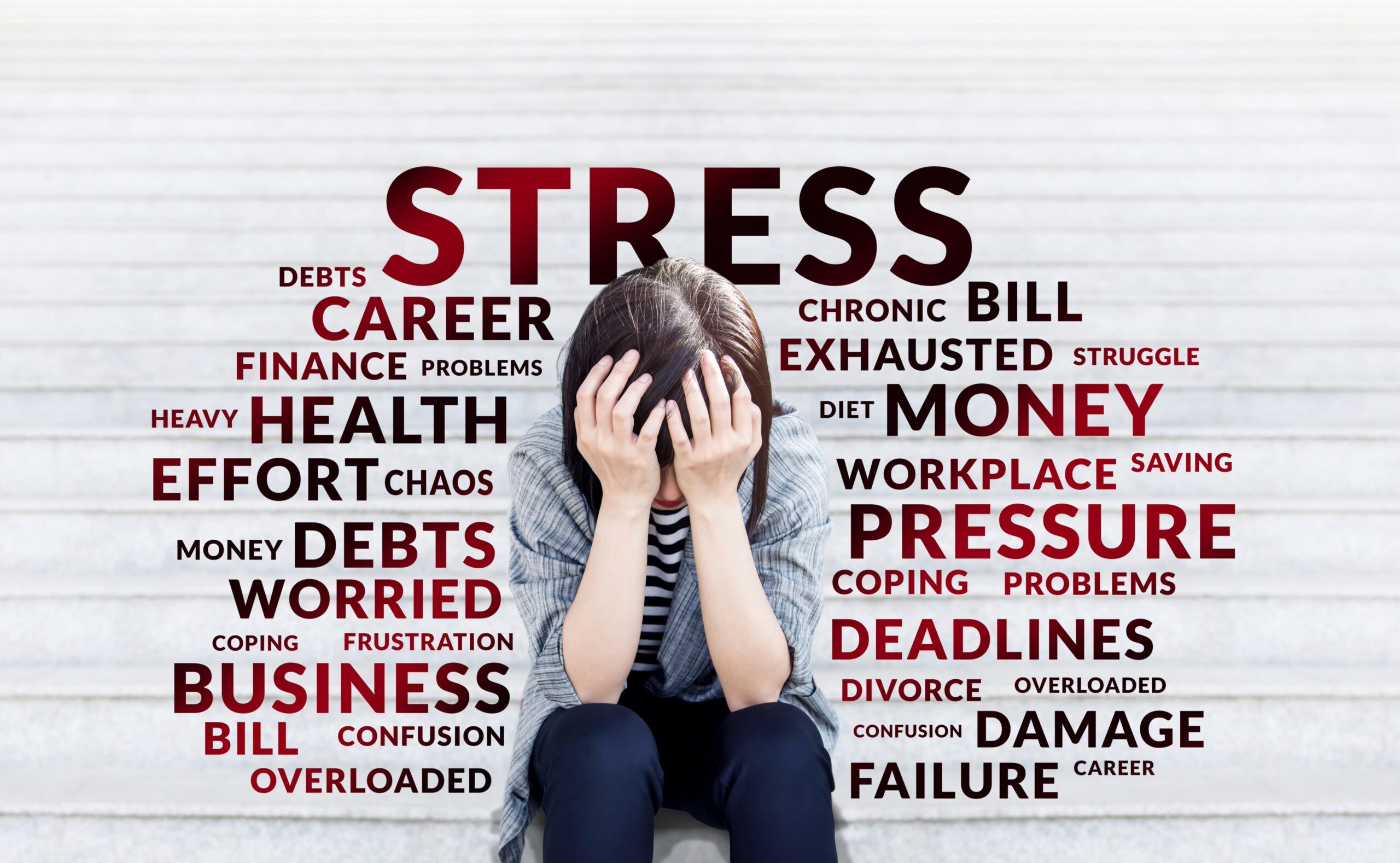
Stress sensitivity
People who have had lots of stress in their lives, whether in childhood or in adulthood, become more sensitive to stress, and are at a higher risk for developing IBS. Studies show that over time their brains have adapted to stress in an unhelpful way, which explains this increased sensitivity, and probably also why not everyone with stress has IBS.
Additionally, people with IBS tend to have these similar structural brain changes and increased stress sensitivity also, and a history of highly stressful life periods. For example, I had a client whose gut symptoms began after a serious natural disaster hit her country. This all suggests that chronic stress wreaks havoc on the gut-brain axis and promotes chronic gut issues, like IBS.
What’s more, it’s relatively common that anxiety and depression happen together with IBS, both probably feeding the other. What came first, however, is not clear.
Looking after the gut-brain axis
Everyone can benefit from taking good care of the gut-brain axis, but this is especially important for people with IBS and other functional digestive disorders. It seems that gut symptoms are like the tip of an iceberg – your gut-brain axis may have been disrupted for a while before gut symptoms surface!
How to nurture your gut-brain axis:
- Feed your good gut bacteria with a balanced diet rich in fiber
- Support digestive processes by eating regularly, avoiding overeating, drinking enough fluids, limiting alcohol consumption
- Stimulate vagus nerve and calm the nervous system with stress releasing activities
- Activate brain areas that lower stress sensitivity: breathing exercises, meditation
- Work on your mindset to reduce catastrophizing, expecting problems etc.
- Pay less attention to your gut symptoms
- Nurture body’s processes: keep regular daily rhythms with sleep, meal patterns and exercise, do your best to sleep well
- Perhaps specific supplements, like probiotics can help
It’s a lot! But not impossible to do.

Strong gut-brain axis plan
The first step is to map out honestly how you are doing in these different areas listed above.
The second step is to make a plan: what needs to change and in what order. Consider what might be easier to start with, or what might make the biggest impact.
But you don’t have to figure this out on your own. Nurturing a sturdy gut-brain axis and relieving IBS symptoms in the process is what I do. If you are not sure, let’s chat. You will have the opportunity to tell an expert about your situation, and I will go over your best next steps without you having to commit to a program. I want to make sure you and I are a good match before you invest anything in working together. Book you free consultation here.
I hope you enjoyed learning about the all-important gut-brain axis! If you are feeling overwhelmed by this, just remember that even small adjustments to diet, lifestyle, thought patterns and stress sensitivity can make a big difference. Check out all of my free resources (scroll down my home page) - they provide lots of tips to get going with.
Thank you for reading!
Love,
Anna-Kaisa

PS: Book your free 30-minute consultation here!
PPS: Feeling bloated? Get your copy of the free “5 Easy Ways to Beat the Bloat” guide here!
References
- Chen M, Ruan G, Chen L, Ying S, Li G, Xu F, Xiao Z, Tian Y, Lv L, Ping Y, Cheng Y, Wei Y. Neurotransmitter and Intestinal Interactions: Focus on the Microbiota-Gut-Brain Axis in Irritable Bowel Syndrome. Front Endocrinol (Lausanne). 2022 Feb 16;13:817100. doi: 10.3389/fendo.2022.817100. PMID: 35250873; PMCID: PMC8888441.
- Mayer EA, Nance K, Chen S. The Gut-Brain Axis. Annu Rev Med. 2022 Jan 27;73:439-453. doi: 10.1146/annurev-med-042320-014032. Epub 2021 Oct 20. PMID: 34669431.
- Mayer EA, Labus JS, Tillisch K, Cole SW, Baldi P. Towards a systems view of IBS. Nat Rev Gastroenterol Hepatol. 2015 Oct;12(10):592-605. doi: 10.1038/nrgastro.2015.121. Epub 2015 Aug 25. PMID: 26303675; PMCID: PMC5001844.
- Karakan T, Ozkul C, Küpeli Akkol E, Bilici S, Sobarzo-Sánchez E, Capasso R. Gut-Brain-Microbiota Axis: Antibiotics and Functional Gastrointestinal Disorders. Nutrients. 2021 Jan 27;13(2):389. doi: 10.3390/nu13020389. PMID: 33513791; PMCID: PMC7910879.
- Sun LJ, Li JN, Nie YZ. Gut hormones in microbiota-gut-brain cross-talk. Chin Med J (Engl). 2020 Apr 5;133(7):826-833. doi: 10.1097/CM9.0000000000000706. PMID: 32132364; PMCID: PMC7147657.
If you are wondering the answer to this question, you are not alone. There are millions of people out there experiencing gut symptoms and wondering if they should be worried about them.
The most common IBS symptoms are:
- Abdominal pain
- Bloating and/or distention of the belly
- Constipation
- Diarrhea
The way IBS is diagnosed, in order for your symptoms to “qualify” as IBS, abdominal pain must be present. It can be crampy, aching, and even quite severe. Often it is triggered or made worse by food, bowel movements and stress.

This abdominal pain is also often associated with a change in stool frequency or consistency. It typically gets better after having a bowel movement, and it would actually be concerning if it didn’t. Since abdominal pain in IBS is considered visceral pain, you’ll often feel pain in the midline of the body.
Bloating is a feeling of tightness and fullness of the abdomen, and your belly feels like it is visibly bigger, even though it may or may not be so. Distention is the term for your belly protruding more than usual with measurable increase in the abdominal circumference. People feel like they have a balloon in their belly, or that they are pregnant when they are not pregnant. Bloating and distention can cause discomfort and it may feel embarrassing.
Constipation is an infrequent bowel movement pattern, in which you have a bowel movement less than three times a week. Though it seems to me you can feel constipated even if you move your bowels daily. Constipation usually goes hand in hand with small, hard, pebble-like stools and they are hard to pass. You might feel like your bowels are not emptying fully.
Diarrhea is the opposite of constipation. It refers to loose, watery stools, more than three times per day. Diarrhea could also cause urgency - you can’t wait a minute longer to go to the bathroom or else an accident might happen.

These symptoms can be very debilitating. They might also change from day to day, one day having constipation and the next diarrhea. People experiencing IBS symptoms may feel like they need to watch closely what they eat, not stray too far from the toilet, and avoid going out to see friends, travel or eat out.
If you’ve been experiencing IBS symptoms for longer than a few weeks, or less if the symptoms are very difficult, I encourage you to go get them checked out. Then, even if your symptoms didn’t fulfill the IBS diagnostic criteria, you’d find out whether there’s something more serious going on, or whether there’s nothing to worry about. Either way, it’s better to be in the know than to be guessing!
If you have been diagnosed with IBS, but are not sure whether this is the right diagnosis, I would again encourage you to speak with your doctor. Ask how they diagnosed the disorder and voice your concerns. The end result (should be) that your doctor will either order more tests, or explain to you more thoroughly their thinking process, so that you can rest assured the right call has been made and that you can begin to apply the right therapies.
If you end up being diagnosed with IBS, or even if you’re not, I have what you need to improve your symptoms. Sign up to my IBSwise program, or if you’d like a more individualized approach, book a free 30-minute chat to discuss your next move.
Whatever you do, don’t be left alone with your symptoms! There is so much you can do to ease them.
Love,
Anna-Kaisa

Earlier this month National Geographic published an article headlined “Why women are more likely to have IBS”. I love that big publications such as National Geographic are paying attention to irritable bowel syndrome, as it is so common, and as there is so much misleading information out there. Big publications could help bust some of that misinformation.

The article aimed to explore why more women than men have IBS, and to discuss some of the treatment options. Since the comments below the original Instagram post, where I first spotted the article, seemed to point out some discrepancies, I thought I’d chime in and expand on some of the unclear points. Here are some of my thoughts:
- According to Dr. Raj, a gastroenterologist, IBS is a diagnosis of exclusion – more severe illnesses with overlapping symptoms need to be ruled out before an IBS diagnosis can be made. My experience: not all doctors test for everything, like cancer and IBD. This is probably to save resources, especially in a public healthcare setting, where money is tight. However, this leads to patients feeling unsure of their diagnosis. It's one of the reasons why it's so important to be able to advocate for yourself when talking to doctors. When you know a bit about what to expect, you will feel more empowered to ask the right questions and get the help you need (one of the reasons I created IBSwise). Here’s my wish to doctors seeing patients with IBS and these kinds of gut issues: spend time explaining your decisions on testing and recommendations so that people feel heard, and can understand and accept their diagnosis and thus go for correct treatments, instead of wasting time and money looking in the wrong places.
- The reason why women are more likely to have IBS is hormones. This I can agree with. I wrote a blogpost about it.
- Another reason for women being more susceptible to IBS: sensitivity to stress. Yes, seems true. I was also glad to see stress mentioned early in the article, as this is also what I have found in my IBS research. Stress is a real culprit in IBS, for both women and men. Even so, it seems that both doctors and patients resist this fact. Maybe blaming stress feels like it belittles the problem, which is not true. The effect of stress on gut function is a real physical response triggered by our thoughts, beliefs and feelings. So, IBS is not just in our head, but the brain has a lot to do with it in a real, physical way.

- IBS treatments: proper sleep and stress reduction. Yes, 100% agreement. Poor sleep affects everything, including gut health and stress sensitivity. The article also mentions that “finding your stress management technique, whether it’s meditation, cognitive behavioral therapy or exercise is key for keeping symptoms at bay.” This is correct, but I’d add that you don’t have to choose just one stress management or release method, you can utilize multiple of them. Combining meditation with exercise for example is more effective than doing one or the other. Not to mention there are many other methods to try, too.
- Antidepressants in low doses can help. Yes, true. However, science is showing that dietary changes can be as effective as medication. For this reason experts consider diet to be a first line therapy as compared to meds.
- Low FODMAP diet is considered to be an effective approach. Yes, studies show that the low FODMAP diet helps reduce symptoms in 2/3 of cases or so. However, the article is not mentioning any risks involved with the diet. Like reduced enjoyment of eating, increased cost, food relationship changes (like food fears) and that the diet can cause stress, which is not helpful when stress is a major IBS trigger. To me, deciding on whether or not to follow the low FODMAP diet should be given thorough consideration. It shouldn’t be something automatic for every IBS patient. This even though it is one of the more natural approaches to managing IBS. Other, more simple, diet changes may be all that is needed.
- Proper hydration is key. Someone commented below the article on Instagram that they drink a lot of water, and increasing water intake doesn’t help them (this person even seemed frustrated by this advice). Both the article and the commenter are correct: drinking enough fluids is important, but if you already are drinking a lot, at least 2 liters (8 cups) a day, then drinking more is not going to help. The point is that dehydration dries out stool in the gut, predisposing us to constipation.

- Fiber is needed. It’s true that most people in the Western world don’t get enough of it, not even close. However, the article doesn’t go into any detail here, they only mention that many brands are adding fiber into their products. Fiber is critically important for gut function, and it’s important to note that there are different types of fiber that are handled differently in the gut. This is where speaking with a dietitian is helpful for making sure increasing fiber intake is done right – something the article could’ve mentioned.
- If you have persistent digestive issues, get tested. Yes, absolutely. It’s important to know your gut symptoms are not a sign of something more serious. IBS isn’t serious in the eyes of health care practitioners in that it doesn’t shorten life span, but it’s serious in a different way - it dramatically reduces quality of life. I know it can feel embarrassing to talk to a doctor about your gut function, but taking that step also brings you closer to symptom management and improving your quality of life. Remember that 10% of the global population have IBS, so it’s very common and nothing to be embarrassed about. What’s important is your health and wellbeing.
Thanks for reading! I’m glad we are talking more about IBS publicly, but much more is needed! More publications should write about IBS in an easy-to-understand way. In the meantime you can ask me. I’m here to help!
Love,
Anna-Kaisa

PS: If you have questions about this, or any other gut health or stress topic, get in touch!
PPS: Did you download my free guide “Beat Stress and Boost Your Mood” yet?
Link to the original NatGeo article here.
Have you noticed that your gut functions differently depending on where you are in your cycle? That every time you are about to have your period, your gut gets messed up, or your already loose stools become worse?
You are not imagining it – female hormones do affect the gut, especially through pain sensitivity, how fast the gut contents move (motility), and indirectly through greater stress sensitivity (1-4). Female hormones could explain why women tend to have more IBS than men in general, and more IBS-C than men (1,2). In this article, I briefly go over what this means in terms of gut symptoms.
Menstrual cycle
First, let’s briefly discuss the menstrual cycle. There are three phases:
| Phase | Days | Estrogen and progesterone | Gut impact |
| Menstruation phase | 1-7 | Both are low | Faster motility, higher risk of diarrhea, urgency Increased pain sensitivity |
| Follicular phase | 8-14 (until ovulation) | Estrogen: Increases until peaks at ovulation Progesterone: low | Slower motility |
| Luteal phase | 15-28 | Estrogen: high, drops quickly Progesterone: high | Slower motility |
Female hormones and the gut
Now, let’s dive into how female hormones can change how the gut functions.
Motility
Very simply put (I discuss this subject in more detail in my IBSwise course), estrogen affects the gut by lengthening gut transit time, which means that gut contents move slower through the intestines. When estrogen levels are high, gut moves slower, and when estrogen levels drop, gut motility increases. This is probably why women tend to be more prone to IBS-C, and have constipation especially during follicular and early luteal phases, and higher chance of diarrhea around menstruation. During pregnancy, estrogen levels are high, which could at least partially explain why constipation is so common in pregnant women, especially during the third trimester. (1,2)
On the other hand, progesterone’s effect on gut motility is not as clear, as it affects serotonin mechanisms also, but the overall effect seems to be similar to estrogen: higher levels are associated with slower gut movements (1).
Pain sensitivity
It’s unclear how estrogen affects pain sensitivity, but it looks like changes in estrogen predispose to pain, such as a few days after ovulation when estrogen levels drop quickly (6). Pain sensitivity has also been found to be higher around menstruation when there is an increased number of serotonin receptors due to low estrogen, which leads to detecting pain and sensations more easily. Estrogen affects inflammatory pathways as well, which can lead to higher sensitivity – in IBS it has been noted that the number of a certain estrogen receptor is often high, which increases inflammation and therefore pain sensitivity (1,3,4).

Stress
Another mechanism that can increase gut symptoms in women is that women are naturally more reactive to stress than men. Female sex hormones have been connected to HPA-axis activity, and to a higher limbic system activity (1-3). This all lowers the threshold for a stress response to be triggered in the body, which leads to gut issues, especially in IBS.
Birth control?
What about women on birth control? According to Dr. Liao (5), birth control that allows for menstruation doesn’t protect from hormonal gut changes, but ones that skip menstruation could. Discuss with your doctor if you feel that at different phases of your cycle you experience difficult symptoms, whether it’s constipation during follicular and early luteal phase, or diarrhea and pain around menstruation phase. Still, even though female hormones seem to affect gut symptoms, data doesn’t support utilizing hormone therapies for women with IBS (3).
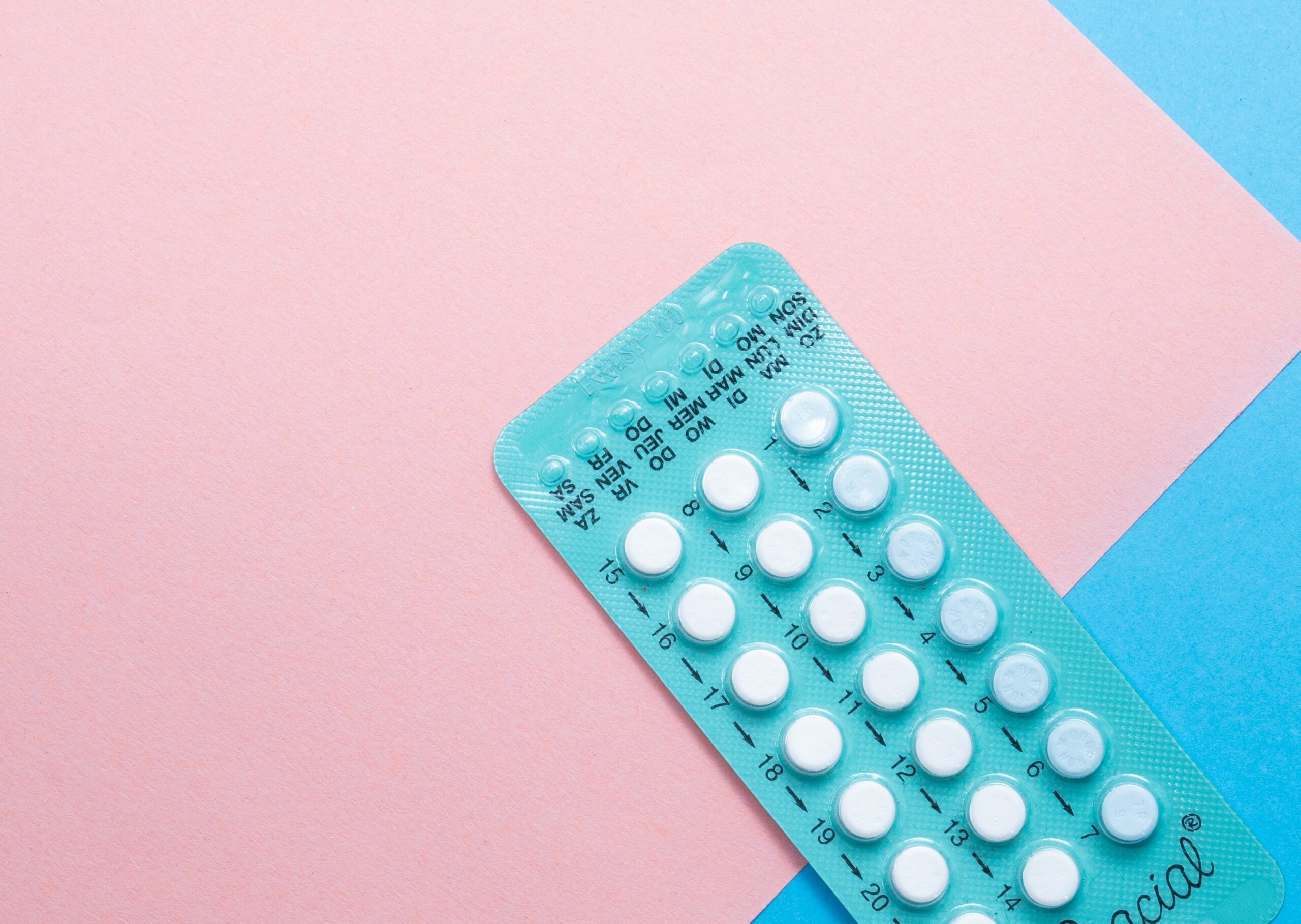
What can you do about it?
If your gut behaves differently during different phases of the menstrual cycle, it’s nice to know it is caused by your hormones. While I don’t recommend observing gut symptoms too closely, knowing when you are more likely to have diarrhea vs constipation could help you anticipate these changes.
Perhaps you can prepare a bit, also – if you are often constipated outside of menstruation, you could increase the amount of fiber you eat at that time of the month, whereas if you experience diarrhea during and close to menstruation, you could utilize soluble fiber from chia seeds, flaxseed and oatmeal. Additionally, focusing on anti-inflammatory foods during menstruation may be useful, like eating lots of colorful fruits and vegetables, and omega-3 rich foods, like walnuts, hempseed, and salmon, although these are important foods to eat every day.
So, female hormones and gut function are connected. Knowing how is useful, as you won’t be surprised by the changes, nor will there be a need to be worried. And you can make better food choices according to your cycle too.
Have a great summer!
Love,
Anna-Kaisa from AKWise

PS: Check out all the free giveaways on my home page!
References
- Meleine M, Matricon J. Gender-related differences in irritable bowel syndrome: potential mechanisms of sex hormones. World J Gastroenterol. 2014 Jun 14;20(22):6725-43. doi: 10.3748/wjg.v20.i22.6725. PMID: 24944465; PMCID: PMC4051914. 3
- Mulak A, Taché Y, Larauche M. Sex hormones in the modulation of irritable bowel syndrome. World J Gastroenterol. 2014 Mar 14;20(10):2433-48. doi: 10.3748/wjg.v20.i10.2433. PMID: 24627581; PMCID: PMC3949254. 4
- Pati GK, Kar C, Narayan J, Uthansingh K, Behera M, Sahu MK, Mishra D, Singh A. Irritable Bowel Syndrome and the Menstrual Cycle. Cureus. 2021 Jan 14;13(1):e12692. doi: 10.7759/cureus.12692. PMID: 33614302; PMCID: PMC7883586. 5
- Chen C, Gong X, Yang X, Shang X, Du Q, Liao Q, Xie R, Chen Y, Xu J. The roles of estrogen and estrogen receptors in gastrointestinal disease. Oncol Lett. 2019 Dec;18(6):5673-5680. doi: 10.3892/ol.2019.10983. Epub 2019 Oct 11. PMID: 31788039; PMCID: PMC6865762.
- Liao, S. Do Your Hormones Affect IBS? WebMD. https://www.webmd.com/ibs/hormones-ibs. Accessed 6/16/2024
- Athnaiel O, Cantillo S, Paredes S, Knezevic NN. The Role of Sex Hormones in Pain-Related Conditions. Int J Mol Sci. 2023 Jan 18;24(3):1866. doi: 10.3390/ijms24031866. PMID: 36768188; PMCID: PMC9915903.
